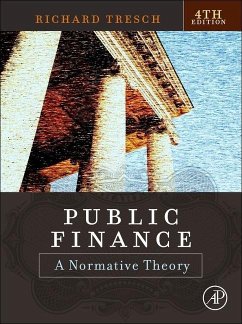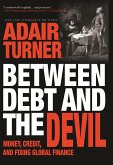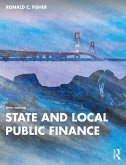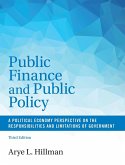- Broschiertes Buch
- Merkliste
- Auf die Merkliste
- Bewerten Bewerten
- Teilen
- Produkt teilen
- Produkterinnerung
- Produkterinnerung
Public Finance: A Normative Theory, Fourth Edition provides a classic text on the normative theory of government policy. This valuable and accessible resource covers the welfare aspects of public economics, with considerable coverage of European examples. The work presents detailed and comprehensive coverage of theoretical literature, empirical work, environmental issues, social insurance, behavioral economics and international tax issues. The book is organized logically, written in an engaging manner, and is both sufficiently rigid for use by those with PhDs in math and accessible to students less well trained in math.…mehr
Andere Kunden interessierten sich auch für
![Public Finance Public Finance]() Harvey RosenPublic Finance57,99 €
Harvey RosenPublic Finance57,99 €![Between Debt and the Devil Between Debt and the Devil]() Adair TurnerBetween Debt and the Devil26,99 €
Adair TurnerBetween Debt and the Devil26,99 €![Project Finance in Theory and Practice Project Finance in Theory and Practice]() Stefano Gatti (Professor, Bocconi University, Milan, Italy and consProject Finance in Theory and Practice70,99 €
Stefano Gatti (Professor, Bocconi University, Milan, Italy and consProject Finance in Theory and Practice70,99 €![Lectures on Public Economics Lectures on Public Economics]() Anthony B. AtkinsonLectures on Public Economics72,99 €
Anthony B. AtkinsonLectures on Public Economics72,99 €![The Demand and Supply of Public Goods The Demand and Supply of Public Goods]() James BuchananThe Demand and Supply of Public Goods29,99 €
James BuchananThe Demand and Supply of Public Goods29,99 €![State and Local Public Finance State and Local Public Finance]() Ronald C. FisherState and Local Public Finance36,99 €
Ronald C. FisherState and Local Public Finance36,99 €![Public Finance and Public Policy Public Finance and Public Policy]() Arye L. Hillman (Israel Bar-Ilan University)Public Finance and Public Policy137,99 €
Arye L. Hillman (Israel Bar-Ilan University)Public Finance and Public Policy137,99 €-
-
-
Public Finance: A Normative Theory, Fourth Edition provides a classic text on the normative theory of government policy. This valuable and accessible resource covers the welfare aspects of public economics, with considerable coverage of European examples. The work presents detailed and comprehensive coverage of theoretical literature, empirical work, environmental issues, social insurance, behavioral economics and international tax issues. The book is organized logically, written in an engaging manner, and is both sufficiently rigid for use by those with PhDs in math and accessible to students less well trained in math.
Produktdetails
- Produktdetails
- Verlag: Elsevier Science Publishing Co Inc
- 4 ed
- Seitenzahl: 568
- Erscheinungstermin: 25. April 2022
- Englisch
- Abmessung: 219mm x 281mm x 32mm
- Gewicht: 1552g
- ISBN-13: 9780128228647
- ISBN-10: 0128228644
- Artikelnr.: 62159698
- Herstellerkennzeichnung
- Libri GmbH
- Europaallee 1
- 36244 Bad Hersfeld
- gpsr@libri.de
- Verlag: Elsevier Science Publishing Co Inc
- 4 ed
- Seitenzahl: 568
- Erscheinungstermin: 25. April 2022
- Englisch
- Abmessung: 219mm x 281mm x 32mm
- Gewicht: 1552g
- ISBN-13: 9780128228647
- ISBN-10: 0128228644
- Artikelnr.: 62159698
- Herstellerkennzeichnung
- Libri GmbH
- Europaallee 1
- 36244 Bad Hersfeld
- gpsr@libri.de
Richard Tresch earned a bachelor's degree in 1965 from Williams College and a doctorate in economics in 1973 from the Massachusetts Institute of Technology, where he was a teaching assistant prior to joining Boston College. He joined the Boston College faculty in 1969, and during his 49-year-long career in the college, Dr. Tresch has served as the Chairman of the Department of Economics, Director of Graduate Studies, and Director of Undergraduate Studies. Currently, he is Professor Emeritus of Economics at Boston College. In 1996, he was chosen as the Massachusetts Professor of the Year by the Carnegie Foundation for the Advancement of Teaching. He was one of 585 national entrants in the foundation's U.S. Professors of the Year Program, which salutes outstanding undergraduate instructors, with the award recognized as one of the most prestigious honors to be bestowed on professors. Dr. Tresch, a member of the American Economic Association, has served on the board of editors of the American Economic Review and contributed to the New England Journal of Business and Economics and Public Finance. Moreover, he is the editor of a fourvolume major reference work on public sector economics.
Part I: Introduction: The Content and Methodology of Public Sector Theory
1. Introduction to Normative Public Sector Theory
2. A General Equilibrium Model for Public Sector Analysis
3. First-Best and Second-Best Analysis and the Political Economy of Public
Sector Economics
Part II: The Theory of Public Expenditures and Taxation-First-Best Analysis
4. The Social Welfare Function in Policy Analysis
5. The Problem of Externalities--An Overview
6. Consumption Externalities
7. Production Externalities
8. Global Warming: An Application of Externality Theory
9. The Theory of Decreasing Cost Production
10. The First-Best Theory of Taxation
11. Applying First-Best Principles of Taxation-What to Tax and How
Part III: The Theory of Public Expenditures and Taxation: Second-Best
Analysis
12. Introduction to Second-Best Analysis
13. The Second-Best Theory of Taxation in One-Consumer Economies with
Linear Production Technology
14. The Second-Best Theory of Taxation with General Production Technologies
and Many Consumers
15. Taxation Under Asymmetric Information
16. The Theory and Measurement of Tax Incidence
17. Expenditure Incidence and Economy-Wide Incidence Studies
18. The Second-Best Theory of Public Expenditures: Overview
19. Transfer Payments and Private Information
20. Social Insurance: Medical Care
21. Social Insurance: Social Security
22. Externalities in a Second-Best Environment
23. Decreasing Costs and the Theory of the Second-Best-The Boiteux Problem
24. General Production Rules in a Second-Best Environment
25. Behavioral Public Sector Economics
Part IV: Fiscal Federalism and International Public Finance
26. Optimal Federalism: Sorting the Functions of Government Within the
Fiscal Hierarchy
27. Optimal Federalism: The Sorting of People within the Fiscal Hierarchy
28. The Role of Grants-in-Aid in a Federalist System of Governments
29. International Public Finance
1. Introduction to Normative Public Sector Theory
2. A General Equilibrium Model for Public Sector Analysis
3. First-Best and Second-Best Analysis and the Political Economy of Public
Sector Economics
Part II: The Theory of Public Expenditures and Taxation-First-Best Analysis
4. The Social Welfare Function in Policy Analysis
5. The Problem of Externalities--An Overview
6. Consumption Externalities
7. Production Externalities
8. Global Warming: An Application of Externality Theory
9. The Theory of Decreasing Cost Production
10. The First-Best Theory of Taxation
11. Applying First-Best Principles of Taxation-What to Tax and How
Part III: The Theory of Public Expenditures and Taxation: Second-Best
Analysis
12. Introduction to Second-Best Analysis
13. The Second-Best Theory of Taxation in One-Consumer Economies with
Linear Production Technology
14. The Second-Best Theory of Taxation with General Production Technologies
and Many Consumers
15. Taxation Under Asymmetric Information
16. The Theory and Measurement of Tax Incidence
17. Expenditure Incidence and Economy-Wide Incidence Studies
18. The Second-Best Theory of Public Expenditures: Overview
19. Transfer Payments and Private Information
20. Social Insurance: Medical Care
21. Social Insurance: Social Security
22. Externalities in a Second-Best Environment
23. Decreasing Costs and the Theory of the Second-Best-The Boiteux Problem
24. General Production Rules in a Second-Best Environment
25. Behavioral Public Sector Economics
Part IV: Fiscal Federalism and International Public Finance
26. Optimal Federalism: Sorting the Functions of Government Within the
Fiscal Hierarchy
27. Optimal Federalism: The Sorting of People within the Fiscal Hierarchy
28. The Role of Grants-in-Aid in a Federalist System of Governments
29. International Public Finance
Part I: Introduction: The Content and Methodology of Public Sector Theory
1. Introduction to Normative Public Sector Theory
2. A General Equilibrium Model for Public Sector Analysis
3. First-Best and Second-Best Analysis and the Political Economy of Public
Sector Economics
Part II: The Theory of Public Expenditures and Taxation-First-Best Analysis
4. The Social Welfare Function in Policy Analysis
5. The Problem of Externalities--An Overview
6. Consumption Externalities
7. Production Externalities
8. Global Warming: An Application of Externality Theory
9. The Theory of Decreasing Cost Production
10. The First-Best Theory of Taxation
11. Applying First-Best Principles of Taxation-What to Tax and How
Part III: The Theory of Public Expenditures and Taxation: Second-Best
Analysis
12. Introduction to Second-Best Analysis
13. The Second-Best Theory of Taxation in One-Consumer Economies with
Linear Production Technology
14. The Second-Best Theory of Taxation with General Production Technologies
and Many Consumers
15. Taxation Under Asymmetric Information
16. The Theory and Measurement of Tax Incidence
17. Expenditure Incidence and Economy-Wide Incidence Studies
18. The Second-Best Theory of Public Expenditures: Overview
19. Transfer Payments and Private Information
20. Social Insurance: Medical Care
21. Social Insurance: Social Security
22. Externalities in a Second-Best Environment
23. Decreasing Costs and the Theory of the Second-Best-The Boiteux Problem
24. General Production Rules in a Second-Best Environment
25. Behavioral Public Sector Economics
Part IV: Fiscal Federalism and International Public Finance
26. Optimal Federalism: Sorting the Functions of Government Within the
Fiscal Hierarchy
27. Optimal Federalism: The Sorting of People within the Fiscal Hierarchy
28. The Role of Grants-in-Aid in a Federalist System of Governments
29. International Public Finance
1. Introduction to Normative Public Sector Theory
2. A General Equilibrium Model for Public Sector Analysis
3. First-Best and Second-Best Analysis and the Political Economy of Public
Sector Economics
Part II: The Theory of Public Expenditures and Taxation-First-Best Analysis
4. The Social Welfare Function in Policy Analysis
5. The Problem of Externalities--An Overview
6. Consumption Externalities
7. Production Externalities
8. Global Warming: An Application of Externality Theory
9. The Theory of Decreasing Cost Production
10. The First-Best Theory of Taxation
11. Applying First-Best Principles of Taxation-What to Tax and How
Part III: The Theory of Public Expenditures and Taxation: Second-Best
Analysis
12. Introduction to Second-Best Analysis
13. The Second-Best Theory of Taxation in One-Consumer Economies with
Linear Production Technology
14. The Second-Best Theory of Taxation with General Production Technologies
and Many Consumers
15. Taxation Under Asymmetric Information
16. The Theory and Measurement of Tax Incidence
17. Expenditure Incidence and Economy-Wide Incidence Studies
18. The Second-Best Theory of Public Expenditures: Overview
19. Transfer Payments and Private Information
20. Social Insurance: Medical Care
21. Social Insurance: Social Security
22. Externalities in a Second-Best Environment
23. Decreasing Costs and the Theory of the Second-Best-The Boiteux Problem
24. General Production Rules in a Second-Best Environment
25. Behavioral Public Sector Economics
Part IV: Fiscal Federalism and International Public Finance
26. Optimal Federalism: Sorting the Functions of Government Within the
Fiscal Hierarchy
27. Optimal Federalism: The Sorting of People within the Fiscal Hierarchy
28. The Role of Grants-in-Aid in a Federalist System of Governments
29. International Public Finance








